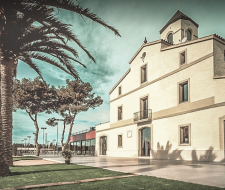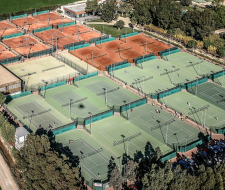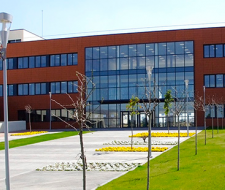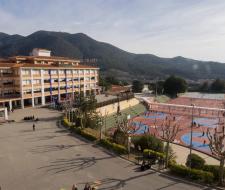Secondary education in Barcelona 2026
- Education information
- Structure of secondary school education in Barcelona
- Peculiarities of primary and secondary school education in Barcelona
- Types of the educational institutions providing secondary school education in Barcelona
- The specifics of passing exams in high school in Barcelona
- Secondary Schools in Barcelona: Advantages
- Education fees
- Admission Requirements
- Literature and references
This content was developed and approved with active participation of Ester Diaz.
In the process of preparing the material, we referenced the following sources:
- https://en.wikipedia.org/wiki/Category:Education_in_Barcelona
- https://www.timeshighereducation.com/student/where-to-study/study-in-spain
-
 In 2022 our students' IB pionts score is 32.5 above the global average of 31.98
In 2022 our students' IB pionts score is 32.5 above the global average of 31.98 SpainBarcelonaCurrently watching: 10from 38000.00 € / year
SpainBarcelonaCurrently watching: 10from 38000.00 € / year -
 98% of our graduates enter university, with the remaining 2% choose sports careerr
98% of our graduates enter university, with the remaining 2% choose sports careerr SpainBarcelonaCurrently watching: 2from 9950.00 € / year
SpainBarcelonaCurrently watching: 2from 9950.00 € / year -
 The school is included in a top-5 best tennis academies in Europe
The school is included in a top-5 best tennis academies in Europe SpainBarcelonaCurrently watching: 2from 40920.00 € / year
SpainBarcelonaCurrently watching: 2from 40920.00 € / year -
 95% of students successfully enter the university
95% of students successfully enter the university SpainBarcelonaCurrently watching: 2from 9104.00 € / year
SpainBarcelonaCurrently watching: 2from 9104.00 € / year -
 Recognized as one of the best schools in Spain
Recognized as one of the best schools in Spain SpainBarcelonaCurrently watching: 1from 30000.00 € / year
SpainBarcelonaCurrently watching: 1from 30000.00 € / year -
 The school is in the top 5 best bilingual schools in Spain
The school is in the top 5 best bilingual schools in Spain SpainBarcelonaCurrently watching: 1from 2700.00 € / month
SpainBarcelonaCurrently watching: 1from 2700.00 € / month -
 In 2023 an average IB score made up 34.4 with the highest grade - 43
In 2023 an average IB score made up 34.4 with the highest grade - 43 SpainBarcelonaCurrently watching: 2from 10650.00 € / year
SpainBarcelonaCurrently watching: 2from 10650.00 € / year -
 from 41995.00 € / 10 months
from 41995.00 € / 10 months -
 In 2023 average mark obtained by students who passed the IIBDP: 36 out of 45
In 2023 average mark obtained by students who passed the IIBDP: 36 out of 45 SpainBarcelonaCurrently watching: 1from 12000.00 € / year
SpainBarcelonaCurrently watching: 1from 12000.00 € / year -
 In 2022 our students' IB pionts score is 32.5 above the global average of 31.98
In 2022 our students' IB pionts score is 32.5 above the global average of 31.98 SpainBarcelonaCurrently watching: 1from 10000.00 € / year
SpainBarcelonaCurrently watching: 1from 10000.00 € / year
Nowadays, Spain's secondary education for international students has gained significant popularity in Europe. The unique characteristics of this educational system, particularly in Barcelona, can sometimes seem overwhelming, as the framework may appear intricate at first glance. However, our specialists offer not only a curated list of premier schools in Spain that welcome expatriate pupils, but also an overview of the secondary education landscape in the country.
Many foreign students from all over the world choose this country, because of the main advantages, such as:
- Educational process in Barcelona is focused primarily on the personal development of each of the students;
- Educational staff place great emphasis on individual work with students;
- The whole educational system in general helps international students to choose the future profession or specialization at the university.
In addition, Spanish schools have been studying foreign languages from the very beginning.
Alternative destinations
Education information
Barcelona, known for its lively atmosphere and historical significance, stands out for providing high standards of secondary education. This guide aims to clarify the nuances and distinct features of secondary schooling in Barcelona, especially for international students.
Schools in Barcelona are becoming increasingly favored by foreign students. Although the educational system may seem challenging initially, it is structured to support a varied range of learners. In this overview, we delve into the specifics of secondary education in both Barcelona and Spain, providing a comprehensive list of the leading institutions within the city.
Many students worldwide are drawn to Barcelona for its educational benefits, which include:
- A focus on personal development: Schools in Barcelona prioritize the individual growth of each student.
- Individual attention: Educational staff in Barcelona emphasize personalized learning experiences.
- Career preparation: The educational system in Barcelona aids students in choosing their future professions or university specializations.
- Language Learning in Barcelona's Middle Schools
- A significant feature of schools in Barcelona is the early introduction and emphasis on foreign language studies. This approach benefits international students, offering them a supportive environment to enhance their language skills.
Our experts have compiled a list of the best educational institutions in Barcelona that welcome international students. This list provides a comprehensive view of each school, including their unique features and educational philosophies.
Structure of secondary school education in Barcelona
The Spanish education system, especially in Barcelona, is structured into three distinct stages, catering to the needs of international students. This structure ensures a comprehensive educational journey from childhood to adolescence.
Primary School: The Beginning of the Educational Journey
The first stage in the Spanish education system is the primary school. International children begin their education at the age of six in primary classes. This foundational stage in schools in Barcelona lasts for six years, where students develop basic academic and social skills.
Middle Schools in Barcelona: Continuing the Educational Path
After completing primary school, students progress to middle schools in Barcelona at the age of 12. This crucial phase lasts four years and is designed to build upon the knowledge and skills acquired in primary school. Middle schools in Barcelona play a pivotal role in preparing students for the challenges of high school.
High School in Barcelona: The Final Stage Before Higher Education
The final stage of secondary education in Barcelona is the high school, known as Bachillerato. Contrary to its literal translation as "bachelor's degree," Bachillerato is not related to higher education but is rather a stage of secondary education. Upon completing this stage, international students in Barcelona have two main options:
- Pursue a full secondary education in high school (Bachillerato), after which they can enter a higher education institution. This path is ideal for those aiming for academic and professional careers requiring university degrees.
- Opt for vocational education (Formación Profesional), which focuses on practical training and skills development for specific trades or professions.

What makes Spanish schools special among all schools in the world? Why do parents choose primary and secondary schools in Spain?
There are many reasons. This is a complete immersion in the Spanish language and culture, in the family environment, the strategic position of the country in the south of Europe. Outstanding, rankings educational institutions - well, a rich historical and artistic heritage, warm and hospitable people, colorful holidays, bright cities, unforgettable traditions and folklore!
Peculiarities of primary and secondary school education in Barcelona
In Barcelona, Spain, the secondary education system encompasses a comprehensive eight-year study period. International students typically begin this educational journey at the age of 6 and complete it by the age of 14. This stage is compulsory, and upon completion, students are awarded a certificate of full secondary education.
The initial five years of this period constitute the primary school phase, known as Educación Primaria. During this stage, students are usually taught all subjects by a single teacher.
The curriculum at primary schools in Barcelona includes essential subjects such as:
- Spanish language
- Mathematics
- Literature
- Natural science and the outside world
- Physical training
- Music art
A key highlight of primary education in Barcelona is the early introduction of foreign language learning, typically starting at the age of 8. English is often the primary foreign language taught, and the instructors are frequently native speakers, often brought in from abroad.
As students progress to the second stage, they enter the actual middle school level, referred to as Educación Secundaria. This phase introduces students to a variety of new subjects and a different teaching approach, where each subject is taught by specialized teachers. Additional subjects introduced at this stage include:
- Basics of computer science
- Drawing
- Physics
- Biology, among others
This well-rounded approach in the middle schools of Barcelona ensures that students receive a diverse and thorough education, preparing them for future academic pursuits.
Types of the educational institutions providing secondary school education in Barcelona
Barcelona offers three distinct types of secondary education:
Public Schools (Colegios Públicos): These schools are free for Spanish citizens. However, they do have some limitations, including:
- Less advanced technical facilities and equipment compared to private schools.
- Larger class sizes, which may limit personalized attention from teachers.
- A higher proportion of students from lower-income families, which can sometimes impact classroom discipline and overall academic performance.
Despite facing various obstacles, the educational quality in public schools is not necessarily inferior to other school types. It is crucial to understand that public schools mainly serve children of Spanish sitizens and residents holding a valid residency permit. Families considering a move to Spain may find that public schools aren't accessible until their residency is secured.
Parastatal Schools (Colegios Concertados): These institutions receive partial funding from either the Catholic Church or the government (through local entities). While many are connected to the Church, international students are not always required to participate in religious education. In comparison to public schools, parastatal schools typically prioritize foreign language acquisition more heavily.
Private Schools (Colegios Privados): These schools accept both Spanish and international students. Particularly notable in Barcelona are international private institutions that implement educational frameworks from countries such as the UK, USA, Germany, and France, while also integrating essential Spanish subjects. They provide programs such as A-Level and the International Baccalaureate (IB). Key advantages of private schools in Spain include:
- More affordable education compared to international standards, yet maintaining high quality.
- Instruction primarily in English, with compulsory Spanish subjects taught in Spanish.
- Smaller class sizes, allowing teachers to dedicate more time to each student. The faculty often comprises highly qualified teachers from around the globe.
Each school type in Barcelona presents unique benefits and meets various needs, offering families a range of options when determining the most suitable educational path for their children.
The specifics of passing exams in high school in Barcelona
Regarding the examination process for high school in Barcelona, Spanish secondary institutions, including those situated in the city, incorporate rigorous testing and assessments as an integral element of education. From the initial stages of primary education, international students are required to take mini-exams in all core subjects at the end of each term. Furthermore, educators may administer tests and evaluations at their discretion to maintain student engagement and prevent stagnation. The academic year culminates with comprehensive final exams covering both compulsory and elective subjects. The results of these tests are compiled, and a council of teachers convenes to decide on each student's promotion to the next grade, taking into account their overall performance.
After completing secondary education, students take final exams. If a student does not succeed, they may repeat the year up to two times, but this can only happen before the age of 16. Those who pass receive a certificate of compulsory secondary education, allowing them to proceed to Bachillerato, the high school education level.
The grading system in Spanish educational institutions is based on a 10-point scale:
- Below 5 points: Unsatisfactory (SS or D)
- 5 points: Satisfactory (S)
- 6 points: Good (BI)
- 7 to 8 points: Very Good (NT)
- 9 points: Excellent (SB)
- 10 points: Outstanding (MH)
This system ensures a clear and standardized assessment of student performance throughout their educational journey in Spain.
Secondary Schools in Barcelona: Advantages
- Cultural diversity and cosmopolitan atmosphere,
- Exposure to various religions and traditions, fostering tolerance and respect,
- Wide selection of educational institutions,
- Internationally recognized programs,
- Top-quality teaching staff,
- Study of multiple foreign languages,
- Enriching academic experience,
- Development of independence, self-confidence, and responsibility,
- Pleasant Mediterranean climate with sunny weather almost year-round,
- Countless attractions and landmarks — one of Barcelona’s strongest features.
Education fees
The average cost of secondary education in Barcelona ranges from €9,000 to €20,000 per year:
- Primary classes (English) — from €12,000 per year,
- Middle classes (English) — from €9,950 per year,
- Senior classes (English) — from €10,500 per year,
- IB — from €38,000 per year,
- A-Level — from €14,000 per year,
- GCSE — from €9,100 per year.
Admission Requirements
To enroll in schools in Barcelona, you need to provide:
- Copy of birth certificate/passport,
- Photos in the required format,
- Completed application form with personal details about the child,
- Grade transcript from the school report,
- Medical insurance,
- Certificate of foreign language proficiency,
- Motivation letter,
- Teacher recommendations.
Learning programs-summary information
| Name | Meaning | Equivalent | Min. age | Duration, years |
Next stage | Cost |
|---|---|---|---|---|---|---|
| GCSE | General certificate of secondary education | secondary education (non-accomplished) | 14 | 1–2 | A-Levels | 15,000 USD+ |
| A-Levels | Advanced level | secondary education (accomplished) | 16 | 2 | University | 15,000 USD+ |
| BTEC | Business and Technology Education Board | secondary special education | 14 | 2–3 | University/ work | 15,000 USD+ |
| Oxbridge Preparation | Preparing for Oxford and Cambridge | secondary education (accomplished) | 17 | 1 | University | 15,000 USD+ |
| International Baccalaureate | International baccalaureate | secondary education (accomplished) | 16 | 2 | University | 18,000 USD+ |
| Foundation/ Pathway Year | Preparatory year | admission to the 1st year of university | 17 | 1 | University | 14,000 USD+ |
| NCUK | The Northern consortium | 2 year university | 17,5 | 1 | 2 year University of NCUK | 13,000 USD+ |
| Special Preparation (Medics/Math/Business) | Specialized training | - | 14 | optional | optional | 4,000 USD+ |
| Academic English | Academic English | Language school | 8 + | 6–12 months | School or University | 8,000 USD+ |
Advantages and disadvantages of English schools
| Advantages | Disadvantages |
|---|---|
| The opportunity to enter the best universities in England, USA, Canada, Switzerland, Europe, the world | Expensive |
| High quality of education and academic standards | Strong workload |
| Perfect English after graduation | The need to change the social environment; it takes time to adapt |
| Useful contacts | The difficulty of choosing the most suitable school for the child, requires a qualified specialist |
Top 21 boarding colleges in England 2026
| 1 | Cardiff Sixth Form College |
| 2 | National Mathematics and Science College |
| 3 | Abbey College Cambridge |
| 4 | d'Overbroeck's College |
| 5 | MPW London |
| 6 | CATS Cambridge |
| 7 | Kensington Park |
| 8 | DLD London |
| 9 | King's College St Michael’s |
| 10 | Bellerbys Cambridge |
| 11 | Chelsea Independent College |
| 12 | MPW Cambridge |
| 13 | Bellerbys Brighton |
| 14 | CATS London |
| 15 | St Clare's Oxford |
| 16 | Bishopstrow College |
| 17 | CATS Canterbury |
| 18 | Bellerbys London |
| 19 | Ealing Independent College |
| 20 | Cambridge Tutors College |
| 21 | Abbey Manchester |
